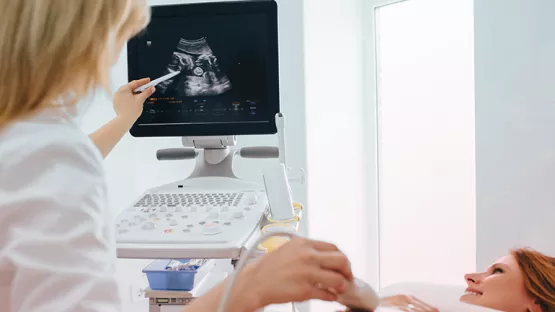Pregnancy Exercises: 4 Types of Easy Workouts for Pregnant Mothers
Why do we need pregnancy exercises? They can help to lower the risk of.... read more

In the fourth week of pregnancy, you are looking at very obvious symptoms such as missed menstrual cycle; feeling of being bloated; unexplained fatigue or exhaustion; pain or tenderness in the breasts; a heightened sense of smell and maybe even hypersensitivity; and mild cramping. Meanwhile, your growing child is around the size of a poppy seed, and numerous hormonal changes will come your way. You may also experience symptoms such as morning sickness and digestive problems. If you are now at this stage of pregnancy, learn more in our week 4 of pregnancy article about what you can do to ease the process.
As you enter the fifth week of pregnancy, the hCG hormone level is high enough for home pregnancy tests to detect and confirm your pregnancy. It is basically a time when you can confirm your suspicions. As your child is around the size of an orange seed, your body is mass-producing hormones like oestrogen, progesterone and hCG. You will also find yourself craving food very often. Symptoms such as fatigue, nausea and frequent urination cannot be avoided, so it is ideal for you to have enough rest and food during this period. If you are now at this stage of pregnancy, learn more in our week 5 of pregnancy article about what you can do to ease the process.
With the arrival of week 6 of pregnancy, you are basically entering the second month. So, how should you feel at 6 weeks pregnant? At this stage, you may not feel very pregnant because there are only a few observable physical changes. However, you may begin to experience physical pregnancy symptoms. Here’s what to expect during week 6 of pregnancy:
Nausea or morning sickness can be common at the 6-week pregnancy stage. Unlike what its name suggests, morning sickness may occur at any time of the day. It can manifest as giddiness and vomiting and is sometimes accompanied by headaches. Thankfully, these symptoms will ease up as you approach your second trimester. A natural way to get rid of nausea and vomiting is to have small portions of food throughout the day rather than three main meals. For some women, acidic fluids like lemonade can help alleviate nausea. It should go without saying but do consult your doctor about the optimum methods you could use to relieve your morning sickness.
For many mums-to-be, smells that are usually harmless or even pleasant could make your stomach churn badly enough that you need to get away from it. Practice breathing in through your mouth and out through your nose, or keep a scarf scented with something that smells good to you to ward off smells that could bother you.
Apart from the increase of nausea at 6 weeks, you may start to feel even more exhausted now than before your pregnancy. No one is entirely sure why this happens to some women and not to others, but it was suspected that hormonal changes may be to blame.
When you are 6 weeks pregnant, your body will be mass-producing pregnancy hormones that boost blood flow, so your breasts may feel sore, swollen, or tender to touch. Rest assured, as this is normal.
Arguably one of the most common signs of pregnancy at week 6 is a steep increase in food cravings. It is a fact that most pregnant women experience some form of food craving or aversion. They can involve anything from savoury curries to sweet desserts, or even food that you do not usually enjoy!
Another one of the signs of pregnancy in the 6th week are gastrointestinal symptoms. These are usually caused by the increased levels of progesterone in your system, which relaxes the muscle tissue in your body and causes your digestion to slow down. This may result in lots of uncomfortable sensations churning in your belly. Some ways to ease them are by taking time when you eat, having a few smaller meals spread out throughout the day, or eating less asparagus, broccoli, brussels sprouts and beans.
At 6 weeks pregnant, your uterus is starting to expand as the size of your child’s increases and may be pressing against your bladder. Pregnancy hormones will increase blood flow to your kidneys, which in turn produce and pumps more urine to your bladder. These factors may cause you to go to the washroom more often. You can reduce the number of trips you take to the washroom by avoiding diuretics such as coffee, tea, alcohol and some carbonated drinks as they increase urine production.
Side note: If it hurts to pee or nothing comes out you may have a urinary tract infection (UTI). The risk of UTI is higher after week 6, so be sure to consult your doctor if this occurs.
If you experience light bleeding in the first trimester, it is best to call on your doctor and arrange for a check-up to make sure everything is going well. Whilst this is a common phenomenon experienced by 25% of all pregnant women in their first trimester, getting yourself checked will give you peace of mind whilst addressing any potential issues (such as problems with the placenta) more immediately.
When you are 6 weeks pregnant, symptoms such as mood swings become more common. This is due to the rise in progesterone and oestrogen levels. You may find yourself developing a little split personality—moody one day, and happy the next. It helps to be in touch with people who understand and can help you through the motherhood journey.
If you have difficulty managing your pregnancy symptoms, or if you feel something is not quite right, don't hesitate to ask your doctor or healthcare provider for assistance. They will be more than happy to help. On the flip side, you may experience little to no symptoms this week. Don't worry, that is perfectly normal too!
While managing symptoms at week 6 can be challenging, the great news is your child's facial features – like the eyes, ears, and nostrils – are taking shape this week of the pregnancy! The cheeks, chin, and jaws are beginning to form. Other organs growing this week include the kidneys, liver, lungs, and heart. The neural tube starts to close around this time, as the division of the brain and spinal cord become more distinct.
At 6 weeks from conception, the foetal crown-to-rump measurement is anywhere from ⅕ to ¼ of an inch (the size of a sweet pea) and growing! Your child would look like a round circle (about 1/17” in length) with a small nub on the side. The nub is the attachment point of the egg to the uterine lining. Buds are starting to develop from the embryo, which will later become the arms and legs.
With the pregnancy steadily brewing, it's time to really watch your diet by consuming nutritious foods, while avoiding anything that could be harmful to your child. You could also get out and get a lot of fresh air. Our bodies can only produce vitamin D when exposed to sunlight!
Here are some other ways you can take care of yourself and your child as you take on the pregnancy symptoms:
The doctor or attending nurse may ask you questions about your health conditions, medical and surgical history, family history, and previous pregnancy (if any), or conduct tests to verify your health and your pregnancy. This information will be necessary for your healthcare provider to test for, assess and take care of any potential medical complications that may arise throughout your pregnancy.
While you are there, this is the week to check on your child’s heart rate. Their heart starts to beat when you're 5 to 6 weeks pregnant, so you may even be able to see the thump-thump on an ultrasound this week. This is a special moment for any mum-to-be! A heart rate of between 100 and 160 beats per minute is a good sign.
We hope this article has been helpful and informative. If you would like to learn more information on this topic, please refer to trusted government websites such as http://myhealth.gov.my or consult with your doctor.
Depending on your digestive system and appetite, at 6 weeks pregnant you may have gained or lost a couple of pounds in the process. Don’t stress about it at this point; your weight gain/loss will probably all even out after birth. The Frisomum® Gold formula is low in Glycemic Index (GI) to help pregnant mums maintain a healthy weight throughout their pregnancy. Before you know it, your child will be in your arms and the whole journey with all its bumps will be totally worth it!
At this stage, your child would have grown into the size of a blueberry or coffee bean. And the wonder that is the umbilical cord starts to form, carrying blood and nutrients to your foetus. Facial features4 like the eyes, teeth, nose and even nostrils become more pronounced. The kidneys, pancreas and other essential organs also start to take shape.
As for the mother, pregnancy symptoms will run rampant, including swollen breasts; mucus discharge; body odour; and heartburn. In order to go through week 7 and come out stronger, you will need a lot of tender, loving care. This includes treating yourself to a facial, making time to relax and unwind, starting exercising and taking showers daily. Also, ginger is your best friend, so learn how to utilise recipes that feature ginger.
If you wish to learn more regarding these changes as well as how you can smoothen the process and handle them better, do read our week 7 of pregnancy article. It is sure to have a few tips on easing your pregnancy journey.
Milk for Pregnant Mum: Frisomum® Gold consists of essential nutrients which are formulated with DualCare+™, to support mum's and their children's daily needs. Read more on what mums should drink during pregnancy.
The signs of pregnancy can differ from woman to woman. It is a good time to start building your support group for the motherhood journey ahead. When in doubt, please call on your relevant medical professional for advice.


